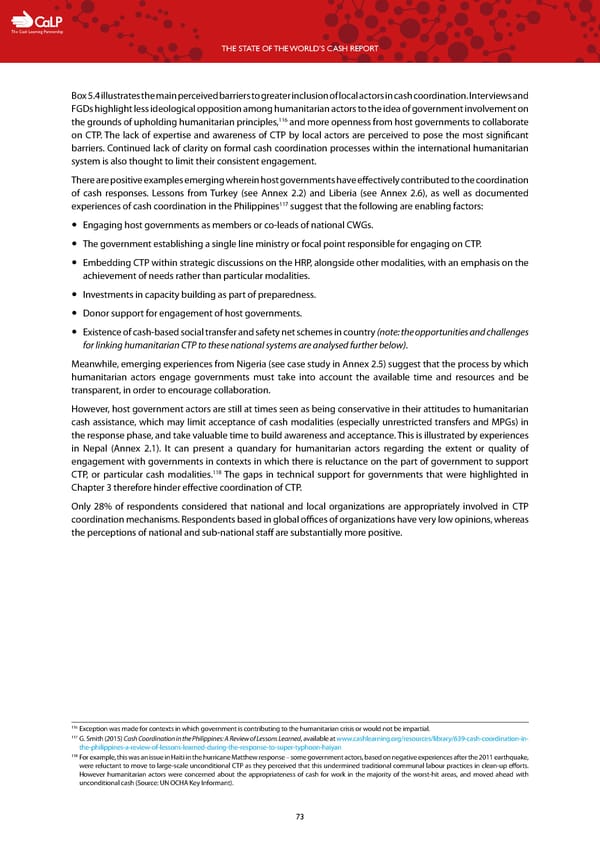C The Cash Learning Partnership THE STATE OF THE WORLD’S CASH REPORT Box 5.4 illustrates the main perceived barriers to greater inclusion of local actors in cash coordination. Interviews and FGDs highlight less ideological opposition among humanitarian actors to the idea of government involvement on 116 the grounds of upholding humanitarian principles, and more openness from host governments to collaborate on CTP. The lack of expertise and awareness of CTP by local actors are perceived to pose the most significant barriers. Continued lack of clarity on formal cash coordination processes within the international humanitarian system is also thought to limit their consistent engagement. There are positive examples emerging wherein host governments have effectively contributed to the coordination of cash responses. Lessons from Turkey (see Annex 2.2) and Liberia (see Annex 2.6), as well as documented 117 experiences of cash coordination in the Philippines suggest that the following are enabling factors: — Engaging host governments as members or co-leads of national CWGs. — The government establishing a single line ministry or focal point responsible for engaging on CTP. — Embedding CTP within strategic discussions on the HRP, alongside other modalities, with an emphasis on the achievement of needs rather than particular modalities. — Investments in capacity building as part of preparedness. — Donor support for engagement of host governments. — Existence of cash-based social transfer and safety net schemes in country (note: the opportunities and challenges for linking humanitarian CTP to these national systems are analysed further below). Meanwhile, emerging experiences from Nigeria (see case study in Annex 2.5) suggest that the process by which humanitarian actors engage governments must take into account the available time and resources and be transparent, in order to encourage collaboration. However, host government actors are still at times seen as being conservative in their attitudes to humanitarian cash assistance, which may limit acceptance of cash modalities (especially unrestricted transfers and MPGs) in the response phase, and take valuable time to build awareness and acceptance. This is illustrated by experiences in Nepal (Annex 2.1). It can present a quandary for humanitarian actors regarding the extent or quality of engagement with governments in contexts in which there is reluctance on the part of government to support 118 CTP, or particular cash modalities. The gaps in technical support for governments that were highlighted in Chapter 3 therefore hinder effective coordination of CTP. Only 28% of respondents considered that national and local organizations are appropriately involved in CTP coordination mechanisms. Respondents based in global offices of organizations have very low opinions, whereas the perceptions of national and sub-national staff are substantially more positive. 116 Exception was made for contexts in which government is contributing to the humanitarian crisis or would not be impartial. 117 G. Smith (2015) Cash Coordination in the Philippines: A Review of Lessons Learned, available at www.cashlearning.org/resources/library/639-cash-coordination-in- the-philippines-a-review-of-lessons-learned-during-the-response-to-super-typhoon-haiyan 118 For example, this was an issue in Haiti in the hurricane Matthew response – some government actors, based on negative experiences after the 2011 earthquake, were reluctant to move to large-scale unconditional CTP as they perceived that this undermined traditional communal labour practices in clean-up efforts. However humanitarian actors were concerned about the appropriateness of cash for work in the majority of the worst-hit areas, and moved ahead with unconditional cash (Source: UN OCHA Key Informant). 73
 The State of the World's Cash | Full Report Page 74 Page 76
The State of the World's Cash | Full Report Page 74 Page 76